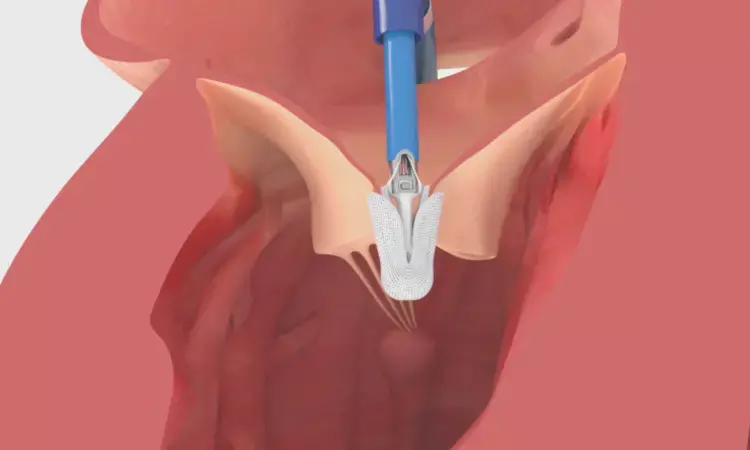- Home
- Medical news & Guidelines
- Anesthesiology
- Cardiology and CTVS
- Critical Care
- Dentistry
- Dermatology
- Diabetes and Endocrinology
- ENT
- Gastroenterology
- Medicine
- Nephrology
- Neurology
- Obstretics-Gynaecology
- Oncology
- Ophthalmology
- Orthopaedics
- Pediatrics-Neonatology
- Psychiatry
- Pulmonology
- Radiology
- Surgery
- Urology
- Laboratory Medicine
- Diet
- Nursing
- Paramedical
- Physiotherapy
- Health news
- Fact Check
- Bone Health Fact Check
- Brain Health Fact Check
- Cancer Related Fact Check
- Child Care Fact Check
- Dental and oral health fact check
- Diabetes and metabolic health fact check
- Diet and Nutrition Fact Check
- Eye and ENT Care Fact Check
- Fitness fact check
- Gut health fact check
- Heart health fact check
- Kidney health fact check
- Medical education fact check
- Men's health fact check
- Respiratory fact check
- Skin and hair care fact check
- Vaccine and Immunization fact check
- Women's health fact check
- AYUSH
- State News
- Andaman and Nicobar Islands
- Andhra Pradesh
- Arunachal Pradesh
- Assam
- Bihar
- Chandigarh
- Chattisgarh
- Dadra and Nagar Haveli
- Daman and Diu
- Delhi
- Goa
- Gujarat
- Haryana
- Himachal Pradesh
- Jammu & Kashmir
- Jharkhand
- Karnataka
- Kerala
- Ladakh
- Lakshadweep
- Madhya Pradesh
- Maharashtra
- Manipur
- Meghalaya
- Mizoram
- Nagaland
- Odisha
- Puducherry
- Punjab
- Rajasthan
- Sikkim
- Tamil Nadu
- Telangana
- Tripura
- Uttar Pradesh
- Uttrakhand
- West Bengal
- Medical Education
- Industry
Patients with severe tricuspid regurgitation may have adverse events in long run

Japan: In the long term, patients with severe tricuspid regurgitation (TR) may experience adverse events, a recent study featured in the Journal of the American Heart Association has shown.
A risk model based on renal or liver dysfunction, pulmonary hypertension, and left atrial enlargement revealed a graded rise in the risk of future adverse events.
Tricuspid regurgitation is a common echocardiographic finding, and it is seen in 70-90% of the general population. TR is believed to be a benign disease and is often asymptomatic and can be managed conservatively with treatments such as diuretic therapy. However, sometimes it can cause right‐sided heart failure and need a catheter or surgical intervention. Recent studies have shown that increased severity of TR was linked with higher mortality. However, the natural history and optimal interventional timing in patients with isolated severe TR have not been appropriately studied.
Against the above background, Naoki Nishiura from Kobe City Medical Center General Hospital in Kobe, Japan, and colleagues aimed to determine long-term clinical outcomes and risk factors linked with poor prognosis in isolated severe tricuspid regurgitation patients.
For this purpose, the researchers retrospectively reviewed successive transthoracic echocardiographic examinations in 2877 patients with isolated severe tricuspid regurgitation. Patients having significant left‐sided valve disease or repeated examinations were not included in the study.
A composite of hospitalization and all-cause death for heart failure (primary outcome) was assessed. Six hundred thirteen patients were enrolled (mean age 74±13 years), and during the median follow-up period of 26.5 months, 141 died, and 62 were hospitalized for heart failure.
The study revealed the following findings:
- The 5‐year event‐free rate was 60.1%. TR pressure gradient (adjusted hazard ratio [HR], 1.03), blood urea nitrogen (adjusted HR, 1.02), left atrial volume index (adjusted HR, 1.01), and serum albumin (adjusted HR, 0.56) were identified as independent predictors of adverse events.
- A risk model based on the four clinical factors that included elevated blood urea nitrogen levels (>25 mg/dL), pulmonary hypertension (TR pressure gradient >40 mm Hg), decreased albumin levels (<3.7 g/dL) and left atrial enlargement (left atrial volume index <34 mL/m2) revealed a graded increase in the risk of adverse events.
"The prognosis of isolated severe TR is not always favorable. In patients with isolated severe TR and concomitant risk factors, such as left atrial enlargement, liver or renal dysfunction, and pulmonary hypertension, careful attention should be paid," the researchers wrote in their study.
"Additional studies are needed to assess the impact of the interventions on clinical outcomes in patients with severe tricuspid regurgitation with concomitant risk factors," they concluded.
Reference:
Nishiura N, Kitai T, Okada T, Sano M, Miyawaki N, Kim K, Murai R, Toyota T, Sasaki Y, Ehara N, Kobori A, Kinoshita M, Koyama T, Furukawa Y. Long-Term Clinical Outcomes in Patients With Severe Tricuspid Regurgitation. J Am Heart Assoc. 2022 Dec 24:e025751. doi: 10.1161/JAHA.122.025751. Epub ahead of print. PMID: 36565178.
Dr Kamal Kant Kohli-MBBS, DTCD- a chest specialist with more than 30 years of practice and a flair for writing clinical articles, Dr Kamal Kant Kohli joined Medical Dialogues as a Chief Editor of Medical News. Besides writing articles, as an editor, he proofreads and verifies all the medical content published on Medical Dialogues including those coming from journals, studies,medical conferences,guidelines etc. Email: drkohli@medicaldialogues.in. Contact no. 011-43720751


